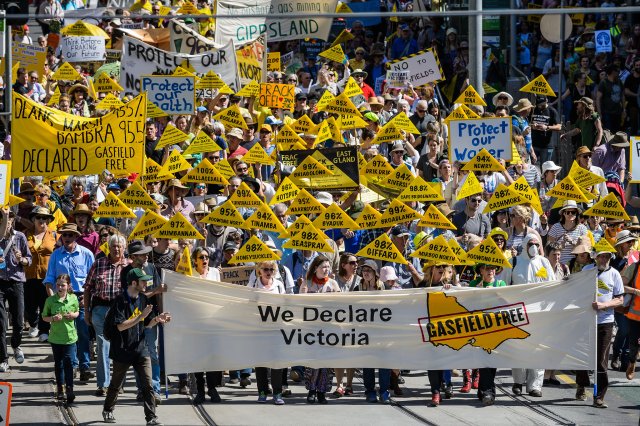
Communities across Victoria have won a permanent ban on unconventional gas mining and fracking. It is the first state to do so and sets a precedent for other states and territories to follow.
The Labor state government announced on August 30 it was banning unconventional gas and extending the moratorium on conventional gas until 2020.
More than 1.4 million hectares of the state had been under threat from some form of gas mining — coal seam gas, tight gas, shale gas and underground coal gasification.
Seaspray dairy farmer Julie Boulton said: “This decision is such a relief for our community. The threat of unconventional onshore gas mining has been hanging over our heads for years.
“It has been so heart wrenching at times, [especially] when we thought the drill rigs were coming and there was nothing we could do. But we pulled together as a community and decided to fight this threat to our farmland, water and health. Today's decision is just fantastic; we are ecstatic.”
Lock the Gate coordinator Chloe Aldenhoven said: “This is good news for every Victorian, but for the farming communities that have been fighting to stop this industry for over five years now, this is a wonderful day. This decision gives them certainty.”
Friends of the Earth spokesperson Cam Walker told Green Left Weekly the campaign had also been aimed at getting a permanent ban on offshore gas, but he was happy with what had been achieved. He said Esso [ExxonMobil] “had not invested for years” and was “looking to get out”.
“The winning strategy of this five-year campaign was organising with non-traditional allies and regional communities across Victoria. Some 75 communities declared themselves 'gas-field free'.
"This was what secured the moratorium under the previous Coalition government and this is what has now delivered us the unconventional gas ban.”
The Victorian campaign against unconventional gas started in 2011 in response to the growing number of applications to mine unconventional gas. Friends of the Earth saw that its best contribution to slowing climate change was “to stop the further development of fossil fuel projects in Australia” and threw itself into the campaign against unconventional gas and coal. It focused on building strong community resistance, helping to organise hundreds of public events in regional Victoria.
Responding to the pressure, the Coalition government decided to keep the moratorium in place until the 2014 state election, where unconventional gas had become a major issue.
Labor, then in opposition, promised to maintain the moratorium and initiate an inquiry into the gas industry, which Premier Daniel Andrews used as the basis for his government's decision to ban the industry.
The inquiry, headed by David Davis, received 1942 submissions, a record number, mostly against the dangerous industry. It found that there was likely to be large commercial and extractable quantities of unconventional gas in Victoria's brown coal fields, and concluded with 15 recommendations mostly concerned with regulating the industry, the resources it wants to use, and forcing it to be much more transparent.
The committee did not reach a majority decision on whether the unconventional gas industry should be banned or a moratorium extended. That was a decision for the government, which it announced on August 30.
Predictably the industry body, Australian Petroleum Production and Exploration Association, slammed the decision, with CEO Malcolm Roberts saying on August 30 there was “no environmental reason to prohibit onshore gas development in Victoria” and the decision would lead to higher gas prices for Victorians.
The Australian Workers Union, which champions the unconventional gas industry, also slammed the decision.
AWU Victorian secretary Ben Davis said: “Given the declining state of our manufacturing sector, we need conventional gas to continue as an industry in its own right and as a reliable and affordable source of energy.”
Showing some confusion about the industry, he said the union supports the ban on fracking but that “new onshore conventional gas exploration and extraction was needed to keep major employers in Victoria”. Despite what the industry says, there is no other way to remove gas from coal seams other than a well stimulation technique known as “fracking”, or hydraulic fracturing.
While the industry continues to assert that the unconventional gas industry is safe for communities and the environment, NASA has just released the results of a survey showing that fracking is a major source of a massive methane “hot spot” in the south-west of the US where 20,000 oil and gas wells are operating.
Methane is a potent greenhouse gas. The NASA study found that leaks from just 10% of the individual methane sources are contributing to half the country's emissions. It confirms scientists' suspicions that the hotspot is connected to the high level of fracking.
[Pip Hinman is a Sydney anti-CSG activist and member of Socialist Alliance.]
Like the article? Subscribe to Green Left now! You can also like us on Facebook and follow us on Twitter.